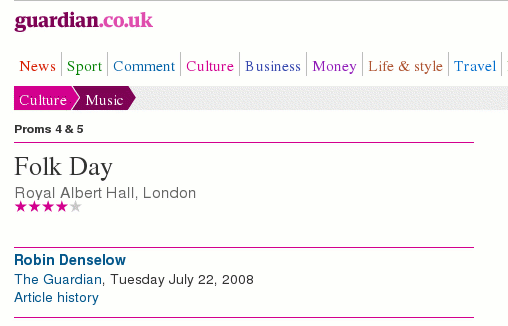
The classical purists were not happy ("Whatever next? Breakdancing, perhaps?" moaned one contributor to the Radio 3 message board) but folk music had been given its first Proms day at last. It was an impressively varied programme. It started with a free show (another Proms first) that was patchy, thoughtful, brave and adventurous, and a second that was classy but safe.
The first concert was by far the more intriguing, and explored how traditional themes have been reworked by classical composers. The young folk singer Bella Hardy started with a confident, unaccompanied I'm Seventeen Come Sunday, which was followed by Vaughan Williams' treatment of the same song in his English Folk Song Suite, performed by the Northern College of Music Wind Orchestra. It sounded pleasant but unchallenging in comparison. So it continued, with Hardy's cool, emotional singing matched against Green Bushes by Percy Grainger, or the disappointing Folk Song arrangements by Luciano Berio, sung by Monica Bacelli.
The best folk-classical showdown came from the glorious Hungarian four-piece Muzsikás, who played violin, bass and flute and gave a rousing demonstration of the traditional themes that influenced their compatriot Bartók. Another successful fusion came from the Northumbrian piper and fiddler Kathryn Tickell, with the world premiere of Confluence, a work involving Muzsikás, all the classical players, and the impressive teenage musicians of Folkestra.
The second Prom was more straightforward. Hardy returned to accompany herself on fiddle, with harp and concertina backing, and was followed by the celebrated guitarist and singer Martin Simpson, and the rousing folk big band Bellowhead. It was a fine cast, but with no experimentation or collaborations, this was now just a standard folk concert.
|
About this article:
This article appeared in the Guardian on Tuesday July 22 2008 on p34 of the Reviews section.
|
